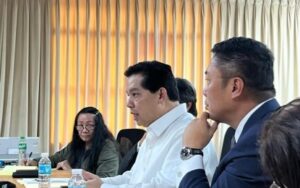I. The Call for Due Process: Romualdez Dismisses Unsworn Allegations

MANILA, Philippines – Leyte First District Representative and former House Speaker Martin Romualdez has issued a strong statement calling for political sobriety and restraint, urging the public and investigators to focus strictly on factual evidence and sworn testimony amidst escalating tensions fueled by sensational corruption allegations.
The controversy stems from video claims made by his former political ally, resigned party-list representative Zaldy Co, who accused Romualdez, alongside President Ferdinand “Bongbong” Marcos Jr., of involvement in budget insertions and anomalies related to major infrastructure projects. Co’s unverified disclosures have rocked the political establishment, coinciding with a planned large-scale accountability rally.
In a press release issued on Saturday, Romualdez firmly asserted that he would not engage in a public media exchange or a “trial by publicity” concerning the accusations leveled against him. This stance is a deliberate effort to pivot the discussion away from political spectacle and back toward established legal procedure.
“My conscience remains clear,” Romualdez stated, emphasizing that throughout the duration of ongoing inquiries into alleged infrastructure-related malfeasance, “no public official, contractor, or witness under oath has linked him to wrongdoings.”
II. The Legal Weight of Testimony: Why Videos “Do Not Hold Water”
Romualdez systematically brushed aside the two video segments released by Co, highlighting a critical legal distinction that often gets lost in the heat of political controversies: the difference between an allegation made in public and a verifiable statement made under oath.
He pointed out that allegations made outside of sworn judicial or legislative proceedings “do not hold water in the court of law.” This assertion grounds the debate in the fundamental principles of the justice system, where evidence must be subjected to cross-examination and penalties for perjury apply.
The former Speaker’s reaction underscores the widely held legal principle that video testimonies, while powerful in the court of public opinion, lack probative value without formal legal substantiation. This legal prerequisite is essential for ensuring that inquiries are not swayed by unfounded rumors or politically motivated attacks. By insisting on sworn testimony, Romualdez is effectively challenging Co to formalize his claims within a recognized legal framework, thereby testing their veracity.
III. Trust in Independent Institutions and Continued Cooperation
In a display of confidence in the nation’s accountability mechanisms, Romualdez reiterated his trust in the independent bodies tasked with evaluating the evidence. He specifically named the Independent Commission for Infrastructure, the Department of Justice (DOJ), and the Office of the Ombudsman as the proper authorities equipped to evaluate the allegations objectively and impartially.
His statement serves two purposes: first, to signal a willingness to submit to the formal processes of government oversight; and second, to encourage the public to trust these institutions to execute their mandate without political interference.
Romualdez pledged his full and continued cooperation with all ongoing investigations, indicating a commitment to transparency, provided that the process adheres strictly to factual findings and legally acceptable evidence.
The call for “sobriety” is, therefore, not just an appeal to the public but a guiding principle for the investigative bodies themselves—that the sensitive nature of the allegations demands a dispassionate, methodical approach, free from the volatile influences of media sensationalism and political maneuvering. The underlying message is clear: the path to truth and accountability must be paved with facts and sworn statements, not with viral videos.





